13+ Best Movies Based on Biblical Stories
A unique list of movies based on the Bible, or at the very least with deep Biblical parallels.
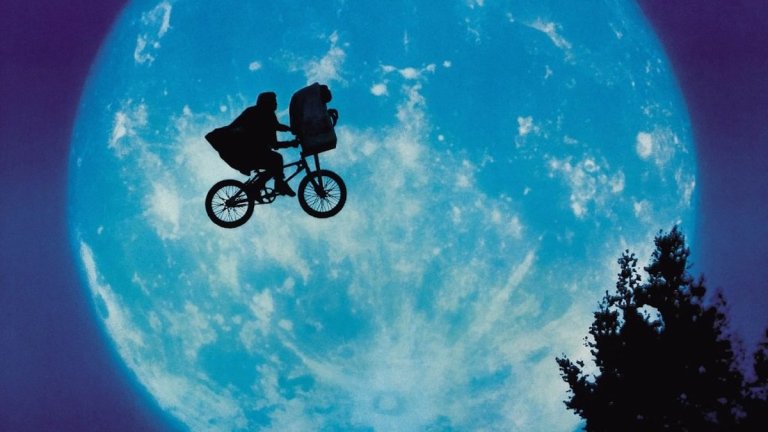
Using the best-selling book of all time as subject matter is a safe wager that has historically guaranteed decent box-office returns. It comes with a baked-in audience familiar with much of the material, while giving a seemingly endless variety of storytelling options from gritty realism to fantasy. The Bible is, at its heart, a collection of hundreds of unique tales penned by a multitude of contributors over a thousand years. It covers concepts from simple human existentialism and historical survival to believable accounts of the supernatural.
Today, biblical scholars continually debate on the validity of its stories in efforts to establish the division between myth and fact. One thing historically stands true for filmmakers: If your script needs a healthy dose of sex, murder, mystery, or magic, the Bible is a one-stop shop from which to draw inspiration. We’ve compiled the 13 best movies that drink from this well and make memorable use of the source material, telling stories as good as those of the ancient pages that inspired them.
Best Movies Based on the Bible
13. Risen (2016)
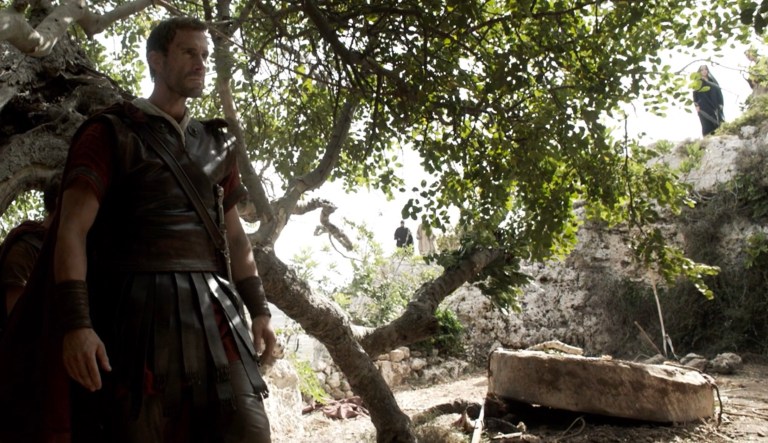
The first century following the disappearance of Jesus and leading to a new church led by Peter is one filled with mystery. In the Bible, it is a venerated saga that mainly lives between chapters, where historical accounts vary and few texts exist. This gap is where Risen resides. Clavius (played by Joseph Fiennes) is a Roman tribune stationed in Judea. He is tasked by Pontius Pilate to gather evidence and locate the freshly crucified body of Jesus, which is missing from its tomb. Has it been stolen? Was he really dead? While being a film about faith, it takes an interesting look at post-resurrection events through the eyes of a skeptical soldier who is loyal to Rome and unswayed by the intangible. The story of this movie is simple yet riveting, thanks to noteworthy performances by Fiennes, Tom Felton, and Cliff Curtis, who continues to show that if you give him the right wig, he can play anyone.
12. Noah (2014)
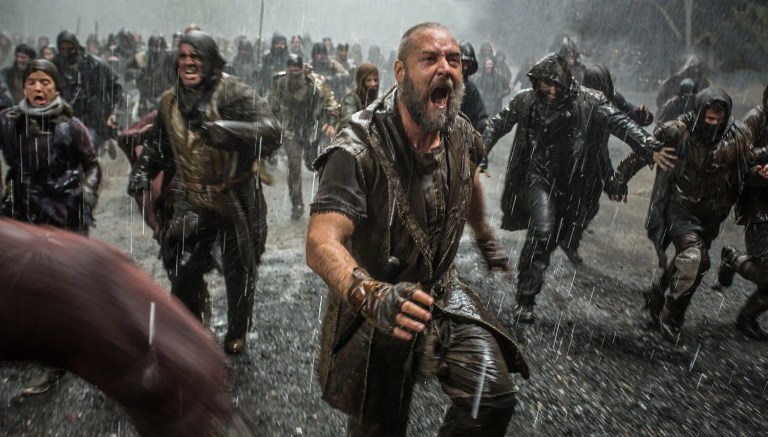
As filmmakers go, Darren Aronofsky is as artistically polarizing as they come. His previous cerebral works such as Pi, Requiem for a Dream, and The Fountain have recently given way to more easily digestible material with greater mass appeal. On the heels of an Oscar nod for Black Swan, he chose to cover the saga of Noah as first told in the Book of Genesis. Being the provocateur he is, Aronofsky also dipped into the Book of Enoch (an apocryphal religious text) as source material and placed his own dark perspective as icing on top. The result is a world of lost men who are sentenced to death by drowning, all of them doing what they can to save themselves. The base story is familiar to us all, but this version dives deeper, giving us fallen angels, battles with men looking to board the ark, and a rare glimpse into the drunken Noah, who loses his way once the ark is no longer necessary. Narrators of the past have kept this a fun fable about cute pairs of animals riding out an inconvenient storm without addressing the lingering questions of mankind’s survival from one family and the near destruction of planet Earth. Noah tackles this difficult subject matter while also giving us regular action, character arcs, and a heavy dose of the supernatural.
11. The Prince of Egypt (1998)

In the late-20th-century rebirth of classically animated films, Dreamworks Pictures threw their hat into the ring to battle against Disney for the cartoon box office. In only their second outing, they produced a fun, star-studded, historically aware movie that cemented their place as a legitimate animation studio. The Prince of Egypt is a telling of the story of Moses that is heavily based upon the biblical book of Exodus. It’s a movie of song, fun, and deliverance while somehow dealing with slavery, plagues, and death in a family-friendly way. The high-tech mixture of classic hand-drawn animation with computer imagery gives a great depth to backgrounds in chariot chases as well as the parting of the Red Sea, that still hold up today. Then there’s the cast. The dais of this film is a who’s who of award-winners and masters of their craft. We get a song performed by Steve Martin and Martin Short alongside Val Kilmer, Ralph Fiennes, Sandra Bullock, Michelle Pfeiffer, Jeff Goldblum, Danny Glover, Patrick Stewart, and Helen Mirren all anchoring their characters with decorum.
10. Abraham (1993)
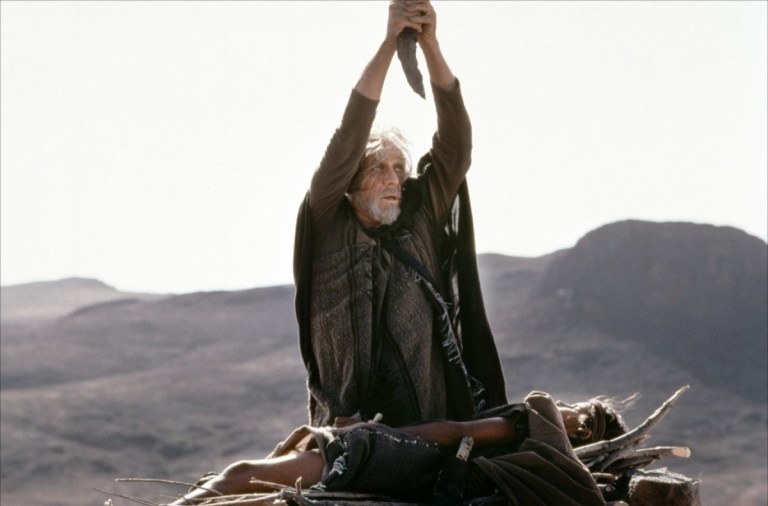
While many entries on this list are artistic interpretations of biblical stories that take liberties with the source material, Abraham is not among them. It is a direct attempt at a near-literal interpretation of the tale from the Book of Genesis. Originally a miniseries made for television, it has proved to be unceasingly popular. The movie has transitioned from two-part television event to single film released on VHS, then DVD, and now digital download. The reason for its high marks and longevity is solely due to the performance of Richard Harris. The man gives us an absolute master class in his craft from the first frame to the last. In many ways it feels less like a movie and more like watching a great stage play from the front row. Abraham’s story is rarely translated to the big screen, as it doesn’t have the flashy miracles and huge action sequences of other stories aside from the cataclysmic Sodom and Gomorrah segments. This movie ambitiously delivers its spiritual punch in a different way. It hits the target as a story driven and sublimely performed origin tale of monotheism that shouldn’t be missed.
9. Barabbas (1961)
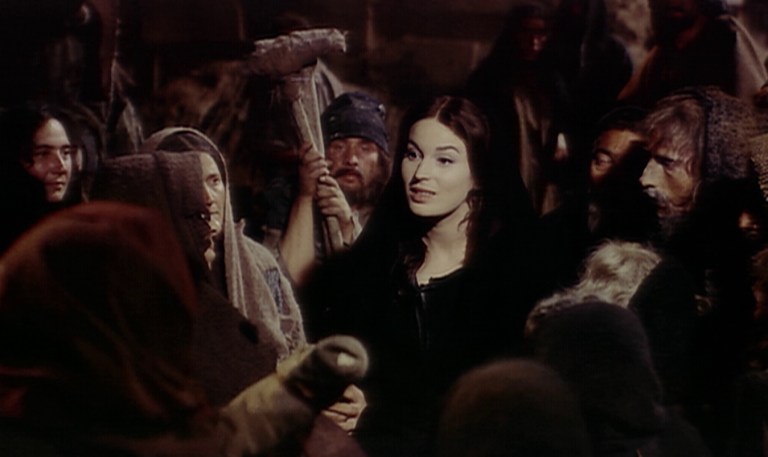
As told in the Gospels, during the trial of Jesus, there was a tradition on Passover for a prisoner to be set free. Instead of letting Jesus go as urged by Roman Governor Pontius Pilate, the people of Jerusalem chose a zealot charged with murder named Barabbas. That’s the beginning of this historical epic, set in the first century. Barabbas is on a long journey of self-hatred and torture. Trading places with Jesus and then watching him die has cursed him inside and out. From this point, our main character is plagued by a supernatural protection that won’t let him fulfill his long-desired destiny of death. Anthony Quinn stars in this swords-and-sandals saga that takes us from the hills of Jerusalem to the sulphur mines of Sicily to the gladiatorial arenas of Rome. This is where we are greeted by our main villain Jack Palance, who is superb in his role of Torvald. Walking away from disasters and into calamity, only to find his final rest after embracing faith, Barabbas is on as much of a journey as the audience. This movie takes all the liberty it can muster to pack as much action as possible into the life of an otherwise bit part in passion plays.
8. Wall-E (2008)

An apocalyptic warning of a future Earth devoid of life may not seem like an Adam and Eve story, but it is. Wall-E is one of Pixar’s best and most unique tales that remains one of the most prophetic as the years pass. Nearly a millennium from today, planet Earth is occupied only by trash-sorting robots, one of which is the title character. Wall-E goes about his job with a lighthearted awareness and sentience missing from his larger, fully automated coworkers. Things change when he meets Eve, a freshly arrived model with a different purpose. He courts her, and eventually the two fall in love. Things are childishly simple and cute until he shows her his prized possession, a seedling. This sets off a sequence of events that alters the entire plot. The plant is preserved inside Eve as the two are brought to a spaceship where modern humans have become so sedentary they can barely move. They are ruled by their own technology and hilariously unable to break free. They’ve forgotten what it is to be human. The struggle to save this planet and reawaken men is the film’s nucleus. Instead of Adam and Eve in the garden of Eden, we have Wall-E and Eve trying to use nature to reestablish man in a new garden and begin again. Whether it’s planting vegetation to start a terrestrial existence or Eve housing the first living entity in her belly or resisting a program to leave “paradise” and start humanity, the Old Testament biblical themes abound in this reverse-Eden animation.
7. East of Eden (1955)
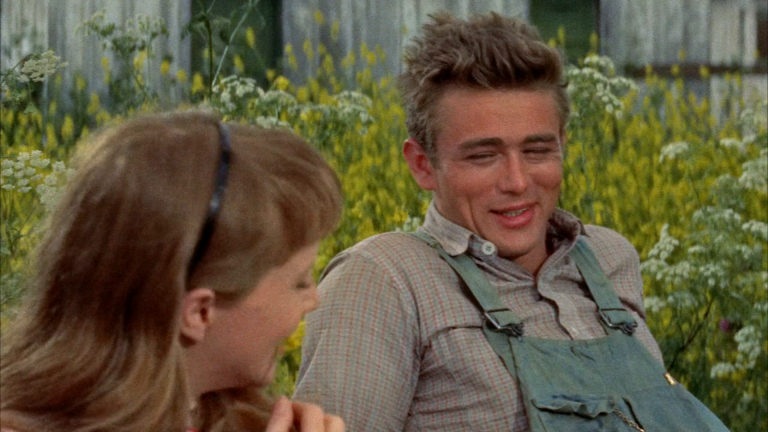
As the title denotes, this John Steinbeck tale is loosely inspired by the story of Cain and Abel. In the original texts, jealous brother Cain slays his brother Abel and is banished by God to leave paradise and dwell in the land of Nod, which is East of Eden. In Steinbeck’s novel-turned-film, the themes are less obvious and the overall concept of “timshel” (the breaking of patterns and destiny) takes precedence. Adam Trask is a widower with a checkered past whose sons Cal and Aron vie for his attention. Cal is a troublemaker who schemes to unravel the life of Aron, the perfect son. Whether it be through business, war, or uncovering family secrets, Cal is unable to turn from his fate, which ultimately condemns Aron to death. Brought to life by renowned director Elia Kazan and featuring a memorable performance by James Dean in his first big screen role, this drama gives us a thought-provoking version of the infamous duo from Genesis.
6. Dekalog (1989)
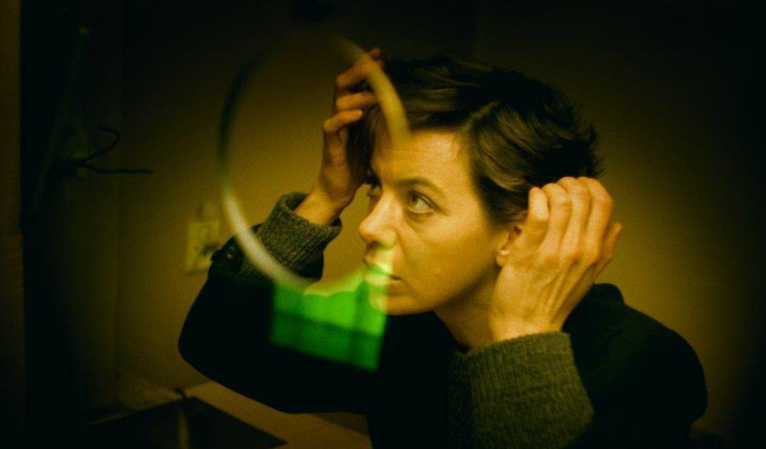
While not a film in the traditional sense and never released as one, this television miniseries is so special that it deserves a place on our list. Dekalog is a very light on dialogue but heavy on imagery, propelled by the cerebral force of Polish director Krzysztof Kieslowski. The whole of it is ten episodes, with each designed to stand as its own entry. They were brilliantly crafted as completely different stories pertaining to one of the Ten Commandments, linked only by the divergent residents of a Polish apartment complex. Plots are as varied as the stories, ranging from kidnapping, voyeurism, and the Holocaust to science and fate. Two of the ten episodes are shorter cuts of actual feature-length movies made to fit the series, which is why it lives nicely on a list such as this. The beauty and timeless resonance of Dekalog are uniquely absorbing experiences of morality one doesn’t often find in standard religious-themed stories.
5. Jesus Christ Superstar (1973)
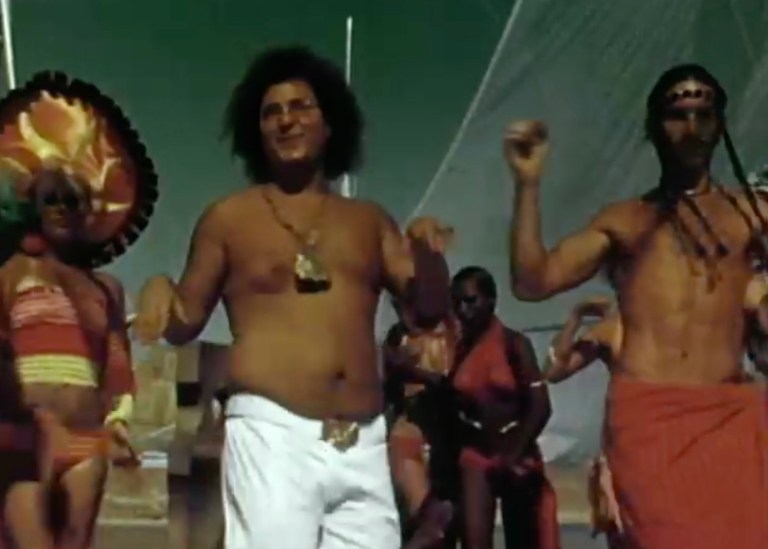
In this glorious 1970s Broadway time machine disguised as a motion picture, the rock opera is brought to theatrical life. Jesus Christ Superstar is the story of the final six days of the life of the messiah told from the vantage of Judas. Oddly enough, this was never originally intended for stage or screen. It began life as a rock double album, created by Andrew Lloyd Webber and Tim Rice. Perhaps why this version of a tale told too often is a much more enjoyable watch is because it transitioned to celluloid only after earning previous success. JCS creates something new by adding fresh energy to Jesus, replacing the usually forlorn and heavy character of productions past. What is unexpected for something so beautifully pop is the deft lighting and cinematography. Not only are we treated to a captivating soundtrack, but the look of the film is on par with contemporary epics such as The Greatest Story Ever Told but purposefully blasted through a kaleidoscope.
4) E.T. the Extra-Terrestrial (1982)
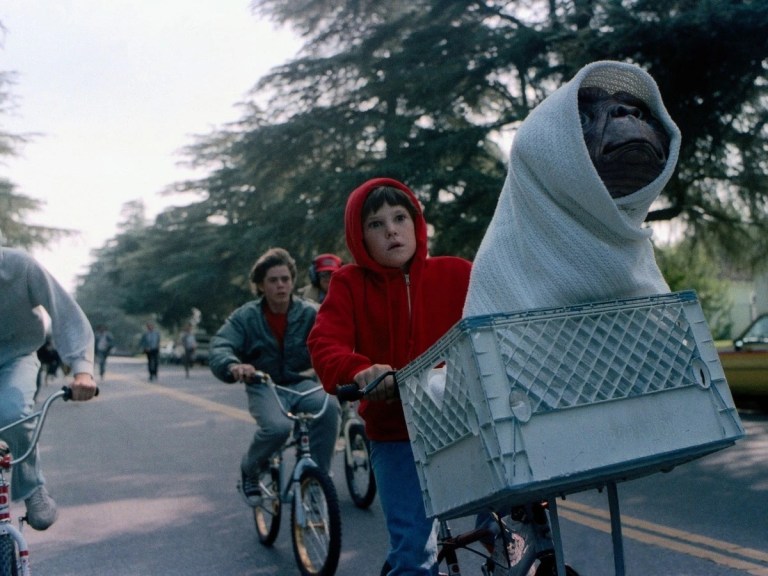
You read that right. E.T. is on this list, and no, this not an episode of Ancient Aliens. While director Steven Spielberg has vaguely denied the purposeful similarities between this movie and the books of the Gospel, they are inescapable. In the film, a traveler from above is stranded on Earth. He exhibits a supernatural ability to heal those he touches, as well as an understanding of the order of things beyond our world. He soon amasses a small group of devoted followers while being hunted by the government. Tragically he dies but is resurrected and performs a miracle before returning to the heavens in full view of his disciples. There are too many “coincidences” between E.T. and Jesus for them to be coincidental. In Spielberg’s biography, he mentioned that during screenings he realized that the resurrected E.T. in the white robe and glowing chest looked like Jesus and the immaculate heart, potentially creating a “sticky situation.” Other viewers have noted that E.T.’s glowing finger touching Elliott’s looks like Michelangelo’s “The Creation of Adam” in the Sistine Chapel. In hindsight, Spielberg joked, “If I ever went to my mother and said, ‘Mom, I’ve made this movie that’s a Christian parable,’ what do you think she’d say? She has a kosher restaurant on Pico and Doheny in Los Angeles.”
3. The Last Temptation of Christ (1988)
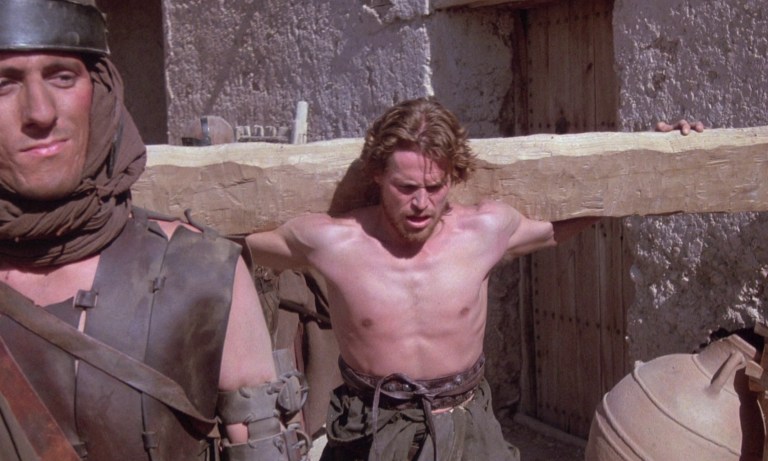
In this raw, thought-provoking period piece from Martin Scorsese, we are faced with a beautifully flawed and human Christ figure. Based on the non-canonical Gnostic gospel of Judas, the origins of this controversial text were spun into a bestselling book by Nikos Kazantzakis. The Jesus of this film is an outcast. He makes wooden crosses for the Romans while being spiritually lost and schizophrenic. He’s tortured by voices and loathes himself for it. Only when he embraces God as the reason for his suffering does he experience any semblance of peace and the supernatural power that is associated with the biblical messiah. In this unique perspective, Jesus often fills in his own gaps when needing guidance, and as a frail human, he is just as lost as those following him. The immovable force here is Judas. He gives the his teacher strength and constantly corrects him, even after he (SPOILER) fails in his final test upon the cross. This movie is a purposefully dirty and unique installment from Scorsese, much different than his other endeavors. It is anchored by the inspired performances of Harvey Keitel and Willem Dafoe, who were overlooked for major awards, likely due to the film’s extremely controversial content.
2. Life of Brian (1979)
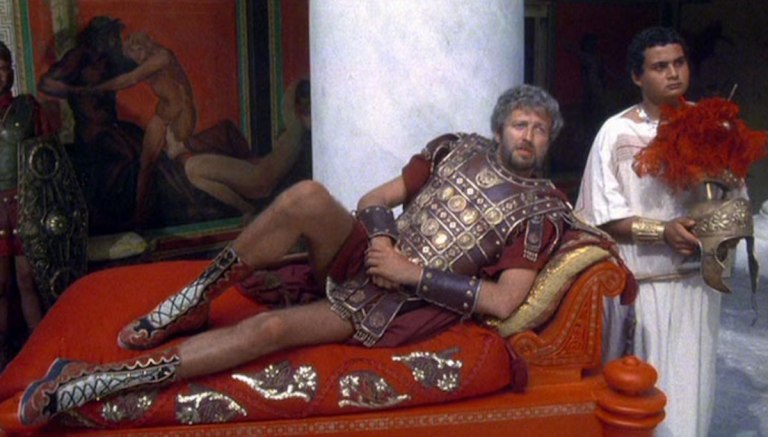
Few people in history have combined fundamental religion with pure humor and escaped unscathed. While promoting Monty Python and the Holy Grail, the brilliantly mad minds of Graham Chapman, John Cleese, Eric Idle, Terry Jones, Terry Gilliam, and Michael Palin came up with the idea for Life of Brian. Brainstorming the concept, they concluded that no one had ever made a comedy about Jesus, and for good reason. After much research, Michael Palin admitted, “It was quite obvious that there was very little to ridicule in Jesus’s life, and therefore we were onto a loser.” Shifting their focus to what could work instead, what we get is Brian of Nazareth: an ill-starred soul who is born next door to, and on the same day as, Jesus. Growing up under Roman rule and resentful of his occupiers, Brian rebels. Sort of. Through a series of misunderstandings and unfortunate timing, he inadvertently starts a movement and is mistaken for the messiah. He amasses followers, is given credit for miracles that never happened, and is finally caught and sentenced to a martyr’s fate. As usual, Monty Python unapologetically addresses all plot points and seriousness of faith with sardonic wit. Before credits roll, we are treated to a climactic mass crucifixion musical number urging us to “Always Look on the Bright Side of Life.” Life of Brian is a movie perfectly designed to poke holes in dogma while crafting timeless jokes that cover foundational truths pertaining to nearly all religions.
1. Rosemary’s Baby (1968)

Surprise! Much like the way it landed at the top of this list, few movies sneak up and smack you right in the face like the ending of Rosemary’s Baby. While one can make an easy association with (ALL SPOILERS AHEAD) the birth of an antichrist to the biblical book of Revelation, the film hints throughout to the nativity and the power of faith using heavy Catholic overtones. Aside from the blatant Christmas imagery and a scene where Rosemary actually stares at a nativity display, there are dream sequences of Catholic nuns, the Sistine Chapel, and even the Pope. This all plays to man’s need for safety in religious tenets while ignoring the danger it creates. It corresponds with Rosemary’s desire to live in a building fraught with evil history and ignoring the death and creepiness in front of her eyes for her own chosen comfort. After the big reveal, it becomes apparent that this is heavily modeled as a parallel to the nativity story. The biblical Virgin Mary was impregnated by the Holy Spirit; in this movie, the delicate and innocent Rosemary has a nightmare where she is raped by the Devil. She becomes pregnant even though she has no memory of conceiving with her husband Cal. Joseph, the prominent Jewish husband of the Virgin Mary, was given knowledge of the pregnancy through an angel. Rosemary’s husband Cal is a Jewish man seeking prominence as an actor. He was told of Satan’s plan to impregnate his wife by the cult and agreed to it for the benefit of his career. When the child is finally born, it is worshiped by groups singing praise and presenting gifts, just as baby Jesus was heralded by shepherds and wise men. If Christ had the nativity, it makes sense for an antichrist to have an anti-nativity of sorts. Rosemary’s Baby is more than influenced by biblical stories, it’s a frightening commentary on the power of religion itself while giving us an alternate version of its most famous tale.
More Biblical Movies
- The Ten Commandments (1956) Cecil B. DeMille’s biblical epic stars Charlton Heston as Moses, who runs into conflict with the Egyptian Pharaoh (Yul Brynner).
- Ben-Hur (1959) Heston returns to the world of biblical drama by starring as Judah Ben-Hur, a Jewish man who lives in Jerusalem and opposes the tyranny imposed upon his people by Rome.
- Joseph and the Amazing Technicolor Dreamcoat (2000) Donny Osmond stars as the biblical Joseph from the Book of Genesis in this cinematic rendering of Tim Rice and Andrew Lloyd Webber’s hit Broadway play.
- The Passion of the Christ (2004) Mel Gibson’s graphically brutal depiction of the last 12 hours of Jesus Christ’s life on Earth.
- One Night With the King (2006) Peter O’Toole and Omar Sharif star in the biblical tale of Hadassah (Tiffany DuPont), an impoverished girl who grows up to become Esther, Queen of Persia.
- Exodus: Gods and Kings (2014) Christian Bale portrays Moses in Ridley Scott’s recreation of the biblical Book of Exodus.
- Mother! (2017) Darren Aronofsky’s modern-day horror film cites several biblical passages in order to push along the narrative. Many critics were unsure whether or not Aronofsky was mocking the Bible.
- Mary Magdalene (2019) Rooney Mara stars as the biblical prostitute who became mesmerized by the message of Jesus Christ (Joaquin Phoenix).
